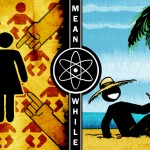Every Monday in Citizenship Confusion, Alan Noble discusses how we confuse our heavenly citizenship with citizenship to the state, culture, and the world.
Early on Sunday, in the Kandahar Province of Afghanistan, a U.S. Sergeant (allegedly) walked from the military base where he was stationed on a “a village stabilization operation,” [NYTimes] which involved building relationships with local leaders, to a village in the Panjwai district, where he moved through three homes, killing entire families, gathering their bodies, and setting them on fire.
Among the 16 dead were 9 children.
As of late Sunday night, there is still no word on what motivated this rogue soldier to commit the massacre, but there are a number of realities about war in general and the wars in Iraq and Afghanistan in particular that can help us as Christians to contextualize this tragedy and reevaluate warfare.
The New York Times has reported that the soldier had 11 years of experience and had already served three tours in Iraq; the stress of such tours could have had serious psychological effects on the soldier. An ugly and utterly inglorious reality of warfare, and perhaps particularly modern warfare, is the high rates of mental illness and suicides among soldiers in active duty. For example, a recent study has shown that between 2004–2008, suicide rates increased more than 80% in the Army. And rates of mental illness have risen similarly. It seems quite plausible (or even likely) that this soldier experienced a profound mental breakdown which drove him to commit this horrible crime.
Mental illness is not the glorious, heroic, cinematic face of war sold to us in recruiting campaigns. It’s honorable to come home physically wounded from war, but not so honorable to come home paranoid or violent. Yet this is the reality of modern warfare, and to ignore it is to ignore the true nature of combat. I suspect that this is what Nick Olson had in mind last week when he wrote about Act of Valor: “An honest concern for the emotional and moral turmoil that soldiers experience in wartime pays better tribute to their sacrifice because it would humanize them — and the countries they represent — in all of their potentiality for good and evil.”
Whether or not it turns out that this soldier had a severe mental illness like PTSD, our country needs to reckon with the psychological casualties of war, preferably before we send our troops into combat.
Another (related) potential factor in this tragedy is the dehumanization of Afghans by U.S. forces. This is not the first time that U.S. forces in Afghanistan have intentionally killed civilians. Last year, I wrote about the infamous “Kill Team” which killed Afghans for sport, videoed and photographed the murders, and shared the footage and pictures with friends. Perhaps the most haunting quote from the Rolling Stone article on the Kill Team described the soldiers’ utter disgust with Afghans:
“Toward the end of Morlock’s [a member of the kill team] interview, the conversation turned to the mindset that had allowed the killings to occur. ‘None of us in the platoon – the platoon leader, the platoon sergeant – no one gives a fuck about these people,’ Morlock said. Then he leaned back in his chair and yawned, summing up the way his superiors viewed the people of Afghanistan. ‘Some shit goes down,’ he said, ‘you’re gonna get a pat on the back from your platoon sergeant: Good job. Fuck ‘em.’”
Nearly all substantiated reports say that the soldier acted alone, and as Obama has stated, “This incident . . . does not represent the exceptional character of our military and the respect that the United States has for the people of Afghanistan.” And yet, I worry that in distancing ourselves from this soldier’s actions, we too easily overlook the effects of warfare on our troops’ morality. As the above quote demonstrates, some of our forces have dehumanized not only their enemies, but also the civilians around them. Could this dehumanization of the Afghan people have contributed to Sunday’s massacre? Perhaps, and even if it didn’t in this particular case, as Christians we should be deeply concerned about how our wars have affected the morality of our soldiers, as I’ve argued before.
Finally, whether it factored into this tragedy or not, we need to acknowledge and address the wide-spread and socially accepted (in some circles, at least) racism, bigotry, and hatred of Arabs and Muslims in our country. If we allow others to spread unchallenged the idea that Muslims are all violent, irrational animals who will seek to slaughter us unless we kill them first, then we have no right to disown the soldier who slaughtered these civilians.
If you don’t think this idea exists and is being spread, I’d encourage you to read this summary of how FOX News readers responded to the tragedy in the Panjwai district.
Or look at how some of the readers at JihadWatch.org speak about Muslims.
Or do a Google search for “Nuke Mecca.” And weep.
Until more information comes out about this incident, we cannot and should not speculate too confidently about what might have precipitated it; however, as Christians who have a responsibility to our neighbors in Afghanistan and our neighbors in uniform, we should use this incident as an opportunity to reflect on the tremendous psychological and moral casualties of war and the danger of allowing anti-Arab racism and anti-Muslim bigotry to go unchecked in our public discourse. And pray for all those affected.











